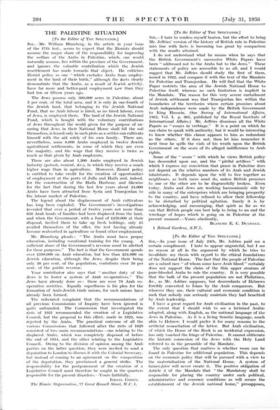[To the Editor of THE SPECTATOR.] SIR,—In your issue of
July 24th, Mr. Ashbee paid me a certain compliment. I' hate to appear ungrateful, but I see no reason at all in the argument by which he tries to invalidate my thesis with regard to the ethical foundations of the National Home. The fact that the people of Palestine are a mixed race " of whom some have Arab blood " certainly does not support the claim of the thin upper stratum of pure-blooded Arabs to rule the country. It is very possible that the bulk of the present population are not Philistines, &c., as Mr. Ashbee supposes, but descendants of Hebrews forcibly converted to Islam by the Arab conquerors. But whoever they are, their cultural and economic condition is such that nobody can seriously maintain they had benefited by Arab leadership.
I have a great regard for Arab civilisation in the past, to the extent that I should wish to see a latinised Arabic adopted, along with English, as the national language of the Jews in Palestine. As it is a living Semitic language, much akin to Hebrew, I would prefer it for many reasons to the artificial resuscitation of the latter. But Arab civilisation, of which the Dome of the Rock is an incidental expression, has only touched the fringe of Palestine. It cannot obliterate the historic connexion of the Jews with the Holy Land referred to in the preamble of the Mandate.
The only question that matters is whether room can be found in Palestine for additional population. This depends on the economic policy that will be pursued with a view to the materialisation of. the National Home.• A system of laissez-faire will never create it. The positive obligation of Article 2 'of the Mandate that "the Mandatory shall be responsible for placing the country under such political, administrative and economic conditions as will secure the establishment of the Jewish national home," presupposes,
therefore, a " managed economy." In other words, a plan of rapid development through national enterprise. Such a plan, naturally, cannot isolate the Arabs or leave them in a state of economic stagnation.
In the letters of Mr. Ashbee and Mr. Jeffries I see traces of a deplorable mentality which obstinately refuses to reckon with fundamental facts. Space forbids me to follow Mr. Jeffries' excursion into recent history, but I must remind him that, whatever his feelings, the Mandate stands. There are twelve million Jews in the countries which fought on the same side with Great Britain in the War, including four and a half million in the United States. They do take the Mandate seriously. Otherwise they would not have sunk a tremendous capital in Palestine. The Jews dastardly killed by Arabs also took it seriously, or they would not have entrusted their lives to British protection.
There is a minority movement, now outside Zionist ranks, which has at least played with the idea of advocating a transfer of the Palestinian Mandate to Italy. Italy is still a member of the League, and so are two other Great Powers, France and Russia. If Great Britain were to tamper with the unequivocal obligations of the Mandate, there would be a serious movement of Jewish and world opinion in favour of the transfer of the Mandate to another Great Power, and a situation embarrassing to British interests might be created. That must be clearly understood.
In a former letter of Mr. Ashbee I saw a reference to " English officials who are trying, under desperately difficult conditions, to administer a policy in which they disbelieve." Plain decency should have demanded that such officials should have resigned their generously salaried positions as soon as they found their duties conflicting with their con- science. Jews contribute some 40 to 50 per cent, of the revenue in Palestine, and they cannot be fairly expected to shoulder the expenditure for officials who are impelled to obstruct the purpose for which they are there, a circum- stance from which many complications have arisen in the past. Plain decency also suggests that the British Govern- ment should resign the Mandate into the hands of the League, if they find it incompatible with British commit- ments or interests elsewhere. Fortunately Lord Melchett's opinion, as quoted by Mr. Ashbee, was erroneous. The Arabs of Palestine were never promised self-determination, or else there would have been no Mandate, certainly not one with a Jewish National Home as its most conspicuous feature.
From a report in The Times of July 24th, I see that the Zionists have complied with my suggestion and offered to renounce the Labour schedule for Jewish immigrants into Palestine which is due in October. In the present mood of the Jewish public it was certainly not an easy decision, and this gesture of goodwill must be warmly welcomed. The Arab leaders are stated to have rejected the proposal and demanded complete cessation of Jewish immigration during the investigations by the Royal Commission " before trying to use their influence to restore normal conditions." Stoppage of immigration beyond the Labour schedule is outside Zionist competence, and it must be emphatically observed that the place of those who haggle about using their influence " in conditions where bombs are thrown at school children is not at the round table, but in gaol. Zionists and the British Administration have heavily blundered in the past and neither are free of blame, but the Arab leaders are of all people the last to imagine that their conscience and their record are clean.—I am, Sir, yours faithfully, WILLIAM BLUMBERG.
[We cannot devote further space to the discussion of the general issue in Palestine as distinct from the immediate situation.—En. The Spectator.]







































 Previous page
Previous page